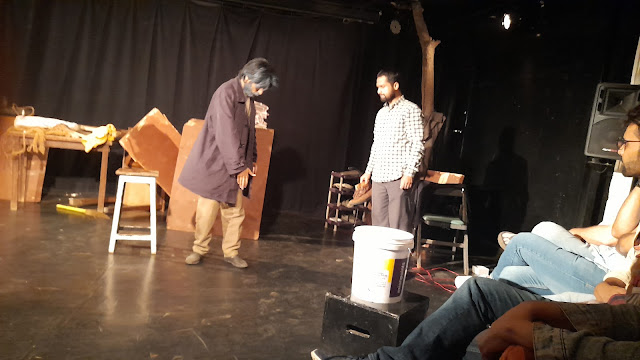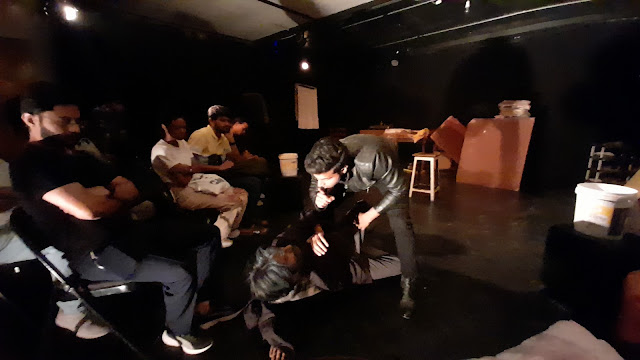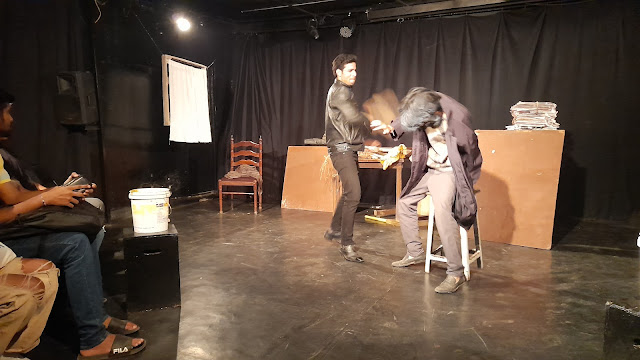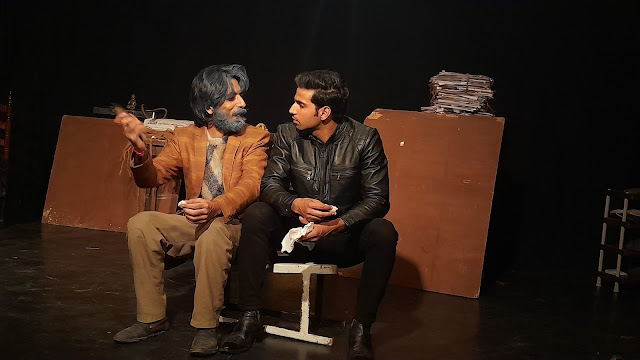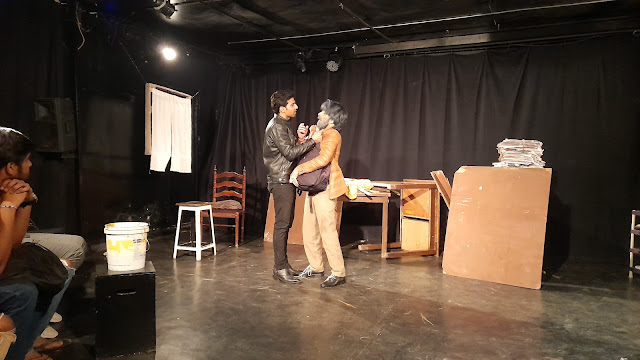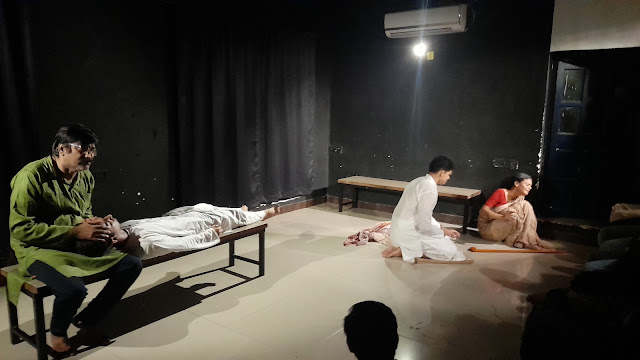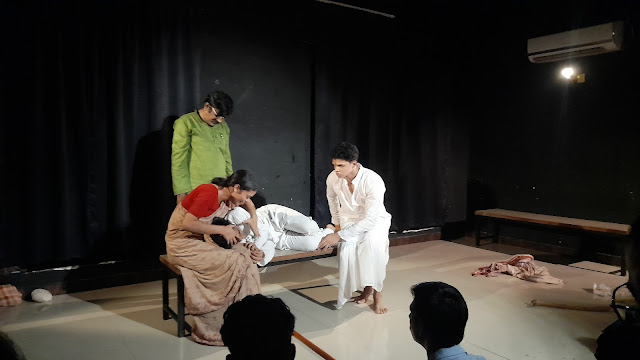A maze of blind alleys
( हिंदी में समीक्षा के लिए - यहाँ क्लिक करके क्रम सं. 36 देखिए )
Whatever you wish is certainly not going to happen. The maze of tantalization will lure you all the way but nothing will come in your hand. 'Uncomfort' is the biggest norm in today's human society.. To brag about is the only implement available to you for solving all the trickiest problems in your life. These are some of the ideas in a nutshell that emerge from the play "The Caretaker" written by Harold Pinter, the Nobel Prize winner in literature for 2005.
A homeless bearded old man Davies is given shelter in the house by Aston, a man who is suffering from the aftereffects of severe electrical shock therapy he has undergone in his past life. The damage of some part of brain has converted him farcically into a more compassionate man. The moment Davies puts his steps in, he begins to criticise vehemently the unkemptness of the house and several other matters. Moreover, he keeps bragging about himself. He complains about his bed, about the seeping roof and about the wrapper he would put on his body. Aston tries to solve all of his problems and even pleads his brother Mick who is the actual owner of the house for making that homeless a 'Caretaker' of the house. Mick has already knocked down Davies badly on the presumption of he being an intruder. But Davies being an ever-changing man succeeds in satiating the ego of Mick to the level that he agrees to make Davies the caretaker of his house. Now Davies think himself a king and takes no time in challenging his original rescuer Aston that he cannot throw him out of the house since he is now an appointed 'Caretaker' of the house by the actual owner Mick. Moving ahead, Davies has the impudity of mocking at Aston forgetting all the vital help he received earlier. While talking to Mick in friendly terms he whispers against Aston many a times. This is too much for Mick and after a fresh round of thrashing he throws Davies out of his house. Now when Davies begs for help to Aston there is no response comes from his mouth while he continually stares out of the window.
Before we discuss about the play we should be ready beforehand that we are entering a terrain which is perfectly dark, doomed and disconcerting. Actually a human society is not as bad as shown in absurdist plays but will certainly become so if they doesn't mend ways. In the present play, the viewers see that the person whose brain is damaged is rather a more compassionate and considerate one than the others who are in possession of fully capable brains. The implicit satire is suggests that in nowadays society, people use their brain only for ill motives. The person who has no shelter is not happy when he is provided with by a kind person and is rather somewhat angry over him just because he is more docile and mentally weak. This uncovers a very dark aspect of societal dynamics that those who are sufferer will suffer even at the hands of those whom they extend help to even on their own initiative. This is definitely frustrating.
The set-design was impressive and gave a perfect impression of neglected household. This house was a threat to the hostel of bachelor students in terms of untidiness and rather it was hundred times higher in degree. Every belongings of the house were dispersed in a haphazard manner and the ambiance was like a jungle. A jungle surrounded by roof and walls. There were big buckets left hither and thither on the room floor to take care of the seeping roof. A massive pile of garbage was put right on the top of a cupboard as if it were a medal to be showcased. The clothing without fold were dropped in a random manner. Aston was mostly seen busy trying to repair plugs picking up from the electrical garbage dumped heavily in a prime spot of the bedroom
An incompleteness cries all through the play in a silent and yet deafening sound. Aston is incomplete because of his mental damage which he tries to fulfill with a companionship but fails. Davies has no identity in this society. Even he has no document proof to show who he is. So he tries to fabricate stories and boasts of himself. He moulds his identity as per the incumbent circumstance as if he is that kind of person only what is needed at that moment. His consistent mention of the downtown Sidcup where he has supposedly kept all his important documents of his identity is nothing but a lie. Because he makes a series of excuses to avoid going there. First, he says he has no shoes to go there, and when a pair of shoes is provided, he finds that it is an unfit pair in his feet. When he is given another pair of shoes by Aston he complains about the different colour of the laces because of which he can't go wearing them. Mick seems to be an energetic person always ready to assault others but himself is nothing but a dreamer. He has big ambitions but never put steps to fulfill them. Still, he is overpowering over the rest two because of his comparatively sound mental and economic condition. So, he is both the owner of the house and mentally normal. This makes him violent and he never miss a chance to thrash Davies for no reasons. He has no much attachment with his brother too but somehow maintain terms with him.
There is a bag throw sequence. A bag perhaps having inside the things of utility for Davies is brought by Aston and shown to Davies. The real needy person is Davies but the bag keeps rolling over from Aston to Mick and never comes to Davies. Though the bag is offered to Davies many a times but whenever he reaches to get it, it is thrown to other person. This is nothing but a reflection of mirage a deprived person is most likely to pass through all through his life.
In this play by Harold Pinter, there is neither story, nor music, nor mystery, nor thrill, nor ideal, nor bizarreness, nor entertainment, yes there is a little humor, that too based on saddness. But for such plays only, he received the Nobel Prize for Literature in 2005 because his plays are closest to the truths of life.
Design & Direction was by Sonu Pilania who succeeded in maintaining the sombre outline of the theme with full vigour.. Saajan Kataria, Sandip Mishra, Sanjay Joshi and Sonu Pilania were the actors who left the people laughing or stunned time to time. Light design came from Subhratanu Mandal and his work was really vital that lived up to the expectations.
This kind of play gives a unique experience and I would say that the absurdist play will never let you feel that it is a play rather you feel that you are peeping out of your window and seeing what is really happening around your house.
Review by - Hemant Das 'Him'
Send your feedback to - hemantdas2001@gmaail.com / editorbejodindiaa@gmail.com


